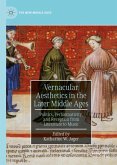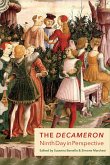- Gebundenes Buch
- Merkliste
- Auf die Merkliste
- Bewerten Bewerten
- Teilen
- Produkt teilen
- Produkterinnerung
- Produkterinnerung
This book examines the literary representation of gardens - a widespread motif in late medieval vernacular fiction - and the redeployment of classical material via vernacular translation.
Andere Kunden interessierten sich auch für
![Vernacular Aesthetics in the Later Middle Ages Vernacular Aesthetics in the Later Middle Ages]() Vernacular Aesthetics in the Later Middle Ages90,99 €
Vernacular Aesthetics in the Later Middle Ages90,99 €![Vernacular Aesthetics in the Later Middle Ages Vernacular Aesthetics in the Later Middle Ages]() Vernacular Aesthetics in the Later Middle Ages91,99 €
Vernacular Aesthetics in the Later Middle Ages91,99 €![Balaam's Ass: Vernacular Theology Before the English Reformation Balaam's Ass: Vernacular Theology Before the English Reformation]() Nicholas WatsonBalaam's Ass: Vernacular Theology Before the English Reformation87,99 €
Nicholas WatsonBalaam's Ass: Vernacular Theology Before the English Reformation87,99 €![Dante and Augustine Dante and Augustine]() Simone MarchesiDante and Augustine69,99 €
Simone MarchesiDante and Augustine69,99 €![Biblical Dante Biblical Dante]() V Stanley BenfellBiblical Dante76,99 €
V Stanley BenfellBiblical Dante76,99 €![Tropes of Engagement Tropes of Engagement]() Leah SchwebelTropes of Engagement115,99 €
Leah SchwebelTropes of Engagement115,99 €![The Decameron Ninth Day in Perspective The Decameron Ninth Day in Perspective]() The Decameron Ninth Day in Perspective84,99 €
The Decameron Ninth Day in Perspective84,99 €-
-
-
This book examines the literary representation of gardens - a widespread motif in late medieval vernacular fiction - and the redeployment of classical material via vernacular translation.
Hinweis: Dieser Artikel kann nur an eine deutsche Lieferadresse ausgeliefert werden.
Hinweis: Dieser Artikel kann nur an eine deutsche Lieferadresse ausgeliefert werden.
Produktdetails
- Produktdetails
- Verlag: University of Toronto Press
- Seitenzahl: 260
- Erscheinungstermin: 28. Januar 2025
- Englisch
- Abmessung: 231mm x 160mm x 28mm
- Gewicht: 476g
- ISBN-13: 9781487558307
- ISBN-10: 1487558309
- Artikelnr.: 70288865
- Herstellerkennzeichnung
- Libri GmbH
- Europaallee 1
- 36244 Bad Hersfeld
- gpsr@libri.de
- Verlag: University of Toronto Press
- Seitenzahl: 260
- Erscheinungstermin: 28. Januar 2025
- Englisch
- Abmessung: 231mm x 160mm x 28mm
- Gewicht: 476g
- ISBN-13: 9781487558307
- ISBN-10: 1487558309
- Artikelnr.: 70288865
- Herstellerkennzeichnung
- Libri GmbH
- Europaallee 1
- 36244 Bad Hersfeld
- gpsr@libri.de
By Simone Marchesi
Preface
Beyond Babel: The Tower and the Garden
Introduction
1. Frameworks
2. At the Origins of the Trope: Eden and the New Testament
3. Neighbouring Tropes: Tradition and Translation
Chapter 1. Encompassing Imperfection: The Garden of the Rose
1. A Literary Space for Translation: The Authorities of the Rose
2. A Curious Literary Garden: Squaring the Circle
3. Deferring Meaning: False Seeming and the Evangile pardurable
Chapter 2. Animal Instability: Dante's Theories of Language before and in
the Commedia
1. Instabilissima avis: Ornithology and Dante's Self-Translation
2. Instabilissimum animal: A Brief History of Human Languages
3. Instabilissimus locus: Contingency, Irony, Solidarity in the Cantos 26
4. Instabilissima signa: Dante's New Linguistic Ecology and the Art of
Acrostics
a. Adam's Edenic Speech
b. The Acrostic of Paradiso 5: An Anti-Babel Fish
Conclusion
Chapter 3. Making Paradise on Earth: The Second Garden of Boccaccio's
Decameron
1. The Intertextual Garden of the Decameron
2. Two Stories for One Place
3. Taking the Cross
Conclusion
Chapter 4. The Old and the New: Chaucer's Garden of Delight
1. Reversion: Translating in Petrarch's Griselda and the Clerk's Tale
2. Elision and Recantation: The Garden of the Merchant's Tale and
Januarie's Songs
Conclusion
Chapter 5. Looking Back and Looking Forward: Reading Levi Reading Dante
Notes
Works Cited
Index
Beyond Babel: The Tower and the Garden
Introduction
1. Frameworks
2. At the Origins of the Trope: Eden and the New Testament
3. Neighbouring Tropes: Tradition and Translation
Chapter 1. Encompassing Imperfection: The Garden of the Rose
1. A Literary Space for Translation: The Authorities of the Rose
2. A Curious Literary Garden: Squaring the Circle
3. Deferring Meaning: False Seeming and the Evangile pardurable
Chapter 2. Animal Instability: Dante's Theories of Language before and in
the Commedia
1. Instabilissima avis: Ornithology and Dante's Self-Translation
2. Instabilissimum animal: A Brief History of Human Languages
3. Instabilissimus locus: Contingency, Irony, Solidarity in the Cantos 26
4. Instabilissima signa: Dante's New Linguistic Ecology and the Art of
Acrostics
a. Adam's Edenic Speech
b. The Acrostic of Paradiso 5: An Anti-Babel Fish
Conclusion
Chapter 3. Making Paradise on Earth: The Second Garden of Boccaccio's
Decameron
1. The Intertextual Garden of the Decameron
2. Two Stories for One Place
3. Taking the Cross
Conclusion
Chapter 4. The Old and the New: Chaucer's Garden of Delight
1. Reversion: Translating in Petrarch's Griselda and the Clerk's Tale
2. Elision and Recantation: The Garden of the Merchant's Tale and
Januarie's Songs
Conclusion
Chapter 5. Looking Back and Looking Forward: Reading Levi Reading Dante
Notes
Works Cited
Index
Preface
Beyond Babel: The Tower and the Garden
Introduction
1. Frameworks
2. At the Origins of the Trope: Eden and the New Testament
3. Neighbouring Tropes: Tradition and Translation
Chapter 1. Encompassing Imperfection: The Garden of the Rose
1. A Literary Space for Translation: The Authorities of the Rose
2. A Curious Literary Garden: Squaring the Circle
3. Deferring Meaning: False Seeming and the Evangile pardurable
Chapter 2. Animal Instability: Dante's Theories of Language before and in
the Commedia
1. Instabilissima avis: Ornithology and Dante's Self-Translation
2. Instabilissimum animal: A Brief History of Human Languages
3. Instabilissimus locus: Contingency, Irony, Solidarity in the Cantos 26
4. Instabilissima signa: Dante's New Linguistic Ecology and the Art of
Acrostics
a. Adam's Edenic Speech
b. The Acrostic of Paradiso 5: An Anti-Babel Fish
Conclusion
Chapter 3. Making Paradise on Earth: The Second Garden of Boccaccio's
Decameron
1. The Intertextual Garden of the Decameron
2. Two Stories for One Place
3. Taking the Cross
Conclusion
Chapter 4. The Old and the New: Chaucer's Garden of Delight
1. Reversion: Translating in Petrarch's Griselda and the Clerk's Tale
2. Elision and Recantation: The Garden of the Merchant's Tale and
Januarie's Songs
Conclusion
Chapter 5. Looking Back and Looking Forward: Reading Levi Reading Dante
Notes
Works Cited
Index
Beyond Babel: The Tower and the Garden
Introduction
1. Frameworks
2. At the Origins of the Trope: Eden and the New Testament
3. Neighbouring Tropes: Tradition and Translation
Chapter 1. Encompassing Imperfection: The Garden of the Rose
1. A Literary Space for Translation: The Authorities of the Rose
2. A Curious Literary Garden: Squaring the Circle
3. Deferring Meaning: False Seeming and the Evangile pardurable
Chapter 2. Animal Instability: Dante's Theories of Language before and in
the Commedia
1. Instabilissima avis: Ornithology and Dante's Self-Translation
2. Instabilissimum animal: A Brief History of Human Languages
3. Instabilissimus locus: Contingency, Irony, Solidarity in the Cantos 26
4. Instabilissima signa: Dante's New Linguistic Ecology and the Art of
Acrostics
a. Adam's Edenic Speech
b. The Acrostic of Paradiso 5: An Anti-Babel Fish
Conclusion
Chapter 3. Making Paradise on Earth: The Second Garden of Boccaccio's
Decameron
1. The Intertextual Garden of the Decameron
2. Two Stories for One Place
3. Taking the Cross
Conclusion
Chapter 4. The Old and the New: Chaucer's Garden of Delight
1. Reversion: Translating in Petrarch's Griselda and the Clerk's Tale
2. Elision and Recantation: The Garden of the Merchant's Tale and
Januarie's Songs
Conclusion
Chapter 5. Looking Back and Looking Forward: Reading Levi Reading Dante
Notes
Works Cited
Index








